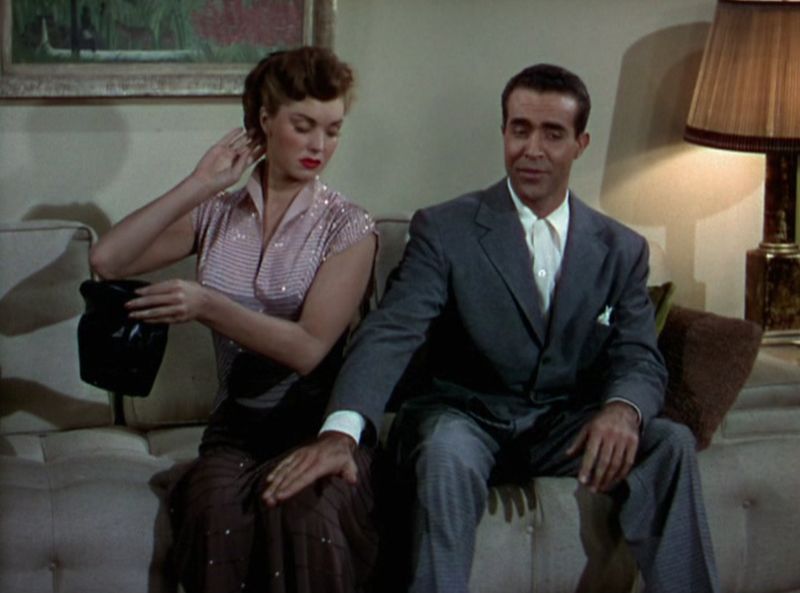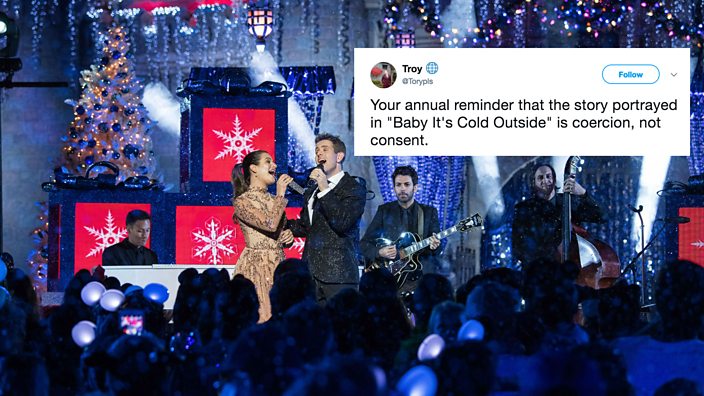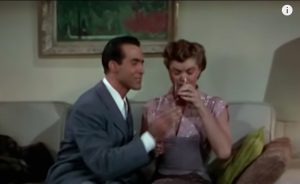Baby It’s Cold Outside: The Saga of a Song
by Neil Andersen and Diana Maliszewski
This is the saga of a song. The melody and lyrics have remained intact, yet its long list of performers and audiences have profoundly changed its experience and perception. At first considered ‘cute,’ and even subversive or liberating, it has become contentious—even toxic—among some of its listeners. The second half of Marshall McLuhan’s famous aphorism, the medium is the message and the audience is the content is especially well illustrated in its story.
Baby It’s Cold Outside (BICO) is a wonderful media literacy text for study and reflection because its checkerboard life connects to many Key Concepts of Media Literacy. Principal among these are Audiences negotiate meaning and Media communicate political and social messages.
Because its lyrics, melody, singing and choreography make BICO delightfully polysemous (having multiple meanings), it invites different interpretations, and people have done exactly that—including us in this post, where we will explore some of the attributes of the song, its performances and its audiences that have made it so compelling.
The lyrics
Frank Loesser was a professional songwriter with many successful movie and musical credits (Guys and Dolls, I’d Like to Get You on a Slow Boat to China, What Are You Doing New Year’s Eve?). Many of his songs involve sexual politics. Because he wrote for movies or musicals, his songs often took a conversational, or call-and-response structure. BICO is a call-and-response song and was a personal composition that he and his wife sang at private parties for 6 years before its publication.
BICO’s lyric sheet names two voices: Wolf (most often a male) and Mouse (most often female). Loesser uses word choice to reinforce the Wolf and Mouse characterizations when Wolf sings, “Listen to the fireplace roar” and Mouse sings “So really I’d better scurry.”
The setting is a man’s living room on a late winter’s evening. Mouse wants to leave Wolf’s home against his protestations. Mouse presents many reasons to leave, mostly related to what people might think of her if she stays the night. Wolf presents many reasons for her to stay, mostly expressing his concerns about her comfort and safety with a smattering of references to his ego and feelings.
The two rarely respond to one another’s lines. While Wolf addresses Mouse with reasons to stay, Mouse’s lines are mostly self-talk, reflecting on her wanting to stay and mostly involving her concern for her reputation. Neither Wolf nor Mouse ever express concern for his reputation. Mouse never mentions the challenges of getting home; but her resolve to leave occasionally weakens (“Maybe just a half a drink more.” “Maybe just a cigarette more.”) The lyrics present two individual and mostly disconnected lines of dialogue coming together into a duet at the end, where Mouse joins Wolf in singing the line he has repeated 4 times.
The Music
There is a difference in the call-and-response musical lines. Many of Mouse’s lines ascend the scale, while Wolf’s either repeat notes or descend the scale. Wolf’s lines usually ‘jump’ Mouse’s lines (begin before the previous line has ended); they sometimes overlap, or sing at the same time. Mouse’s melodies are more unsure, rising questioningly; Wolf’s are more aggressive, dropping conclusively.
They share the melody when their voices come together at the end of each stanza, but it’s not Wolf’s melody. Mouse has joined Wolf’s lyric, but the melody is new, a hybrid of their individual melodies.
The choreography
Some presentations sing the song, but others choreograph actions inferred from the lines. In its original release in Neptune’s Daughter (1949), Mouse puts on her hat and coat repeatedly and Wolf repeatedly removes them. Wolf puts his hand on Mouse’s knee (risqué for 1949) when he sings, “It’s up to your knees out there.”

Neptune’s Daughter MGM
There have been many re-presentations of BICO in 70+ years. Some have reversed the Wolf/Mouse genders,
some have used same-sex singers,
some have parodied the originals. The lyrics have been re-written for political correctness,
but the melody has remained intact. BICO‘s musical quality is strong.
Interestingly, the gender-reverse interpretation first occurred in Neptune’s Daughter, BICO’s 1949 debut. Rather than a straight reverse of the Wolf/Mouse roles, it was played for broad comedic effect by two supporting characters in the movie, one of whom was Red Skelton, a well-known comedian.
BICO has played many different roles; its representations have changed at the whims of its creators and interpreters.
The Audience
BICO’s first audience was comprised of guests at the dinners where the Loessers sang it to signal an end to the party. Loesser’s wife related that BICO was so popular that they were invited simply on the hosts’ expectation of their singing it. These audiences were mostly entertainment industry people who enjoyed the artfulness of the song craft.
When Loesser sold BICO‘s commercial rights to Paramount Pictures, his wife was outraged that he had put a price on their private song (an interesting twist on ‘consent’). Eight versions of BICO were released in its first year and the song has been covered by a who’s who of musical talents and remains a perennial favourite, though not with all audiences.
The last ten years have seen significant discussions of the song as an outdated representation of male dominance and even a ‘date-rape anthem.’ It has been implicated in the #MeToo and #TimesUp movements. “Susan Loesser, daughter of Frank Loesser, blamed the song’s ban on its association with Bill Cosby after television series such as South Park and Saturday Night Live depicted the comedian performing the song following his sexual assault allegations for which he was later convicted.[78]” (Wikipedia) In Ms. Loesser’s interpretation, the attacks on BICO are a result of guilt-by-association—transference of notoriety from convicted pervert to an artwork.
The association of BICO with a growing list of men who have used their power or prestige to coerce sex and the #MeToo movement is compelling. Bill Cosby’s accusations date from 2014, the #MeToo movement dates from 2017. Connecting BICO to events 70+ years after its birth significantly redefines the song, influencing its interpretation, reception and reputation. But the contentiousness has more to do with the audience than it does with the song and it has split public opinion. Some people cannot see a connection between #MeToo and BICO while others are convinced it should be banned.
Several radio stations, including Canada’s CBC, have banned it from their Christmas playlists (and in some cases reinstated it). But banning BICO has made it more popular because taboos fuel curiosity—people want to know what the fuss is about. Parodying it—like the Funny or Die version—causes people to seek and hear the original so that they can understand the parody.
It is even compelling to consider why BICO is considered a Christmas song. A winter storm is referenced in the lyrics, but there are no references to Christmas or even any holiday-related activities. Who decided the song should be a part of the perennial Christmas playlist and why? How has being on the Christmas playlist influenced the ways that people think about and respond to it?
The label ‘date-rape anthem,’ is itself contentious.
Festive Tradition Or Date Rape Anthem? | HuffPost Politics
Despite now being recognized as problematic, there have been recent attempts to rehabilitate "Baby It’s Cold Outside." But is the paean to date rape really worth saving?
Posted by HuffPost on Tuesday, December 19, 2017
Some people think BICO’s lyrics and structure are more about flirtation and seduction, an age-old Wolf-and-Mouse game. Others believe that it illustrates male privilege and female artfulness in the face of male dominance.

Significantly, the public furor and discussion aroused by BICO is a clear indication that songs and their performances are not just casual entertainment, but that society takes media messaging seriously; that we believe that song lyrics, performances and interpretations play a significant role in how people think and act. The notion that pop culture both influences and responds to thinking and behaviour is a most important—and often overlooked—concept, one that The AML has strongly supported, and we welcome the continuing controversies because they help us reflect and grow.
(This lesson idea can be adapted to both Elementary and Secondary classrooms – ed.)




